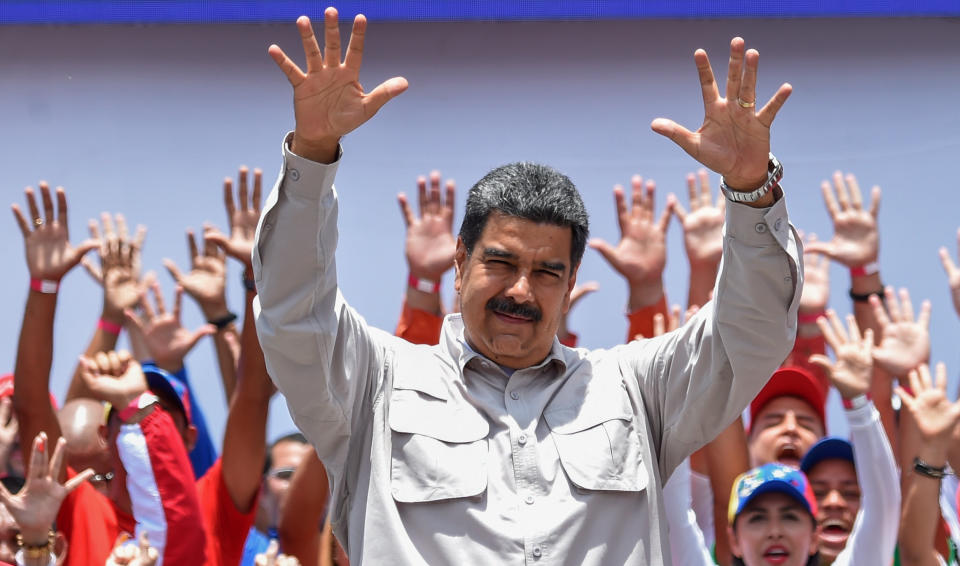Here's why you can't blame socialism for Venezuela's crisis

A common misconception, reinforced recently by U.S. President Donald Trump, is that the crisis in Venezuela is the natural result of a socialist system of government. While it may be true that socialism leads to market inefficiency, the causes of the ongoing crisis in Venezuela are not the result of socialism.
Socialism is not communism, it isn’t fascism and it isn’t dictatorship. At its core, socialism means the government disseminates a country’s wealth among people, and that citizens, rather than companies or wealthy individuals, control production and the distribution of goods.
Socialism can result in diverse outcomes that range from the economy of Norway to that of Venezuela, and socialist leaders who vary as widely as Bolivia’s Evo Morales and France’s former President François Hollande.
It started with falling oil prices
Venezuela’s problems stem from corruption and egregious mismanagement, which can happen anywhere. Countries with socialist regimes such as China, Vietnam, Chile and many in Europe have managed to successfully grow their economies as Venezuela’s has tumbled.
The Maduro government oversaw the nationalized oil sector and took over a number of other businesses while redirecting resources from private companies to some of the country’s poorest citizens. The redistribution plan led to major reductions in poverty under former President Hugo Chávez, who remains very popular in the country.
But it buckled under Maduro when oil prices dropped and he began seizing more industries. The declining price of oil from nearly $120 a barrel in 2014 to around $25 a barrel last year meant Maduro was forced to draw upon other sources of revenue to pay the increasing price of ever-growing national guard protection and to keep loyalist politicians in line. Oil sales are 50% of Venezuela’s gross domestic product and 95% of its export revenue.
A massive increase of unsustainable debt
As private companies left the country Venezuela’s growth waned, and rather than cut back on spending, Maduro simply printed more money, resulting in skyrocketing inflation that has risen to an estimated 14,000% this year. To make matters worse, the country issued massive amounts of debt as government bonds and bonds from state-run oil company PDVSA.
That brought Maduro more cash, but payments on the debt have grown so high that the government can no longer afford to import basic supplies including food and medicine. As citizens starve, losing an average of 24 pounds a year on the “Maduro diet,” the country sends billions to overseas investors in coupon and principal payments. The country can’t issue more debt because of sanctions from the United States, and there’s hardly a market for it at the moment as Venezuela has fallen into default on some of its bonds.
Venezuela also has increasingly entered agreements with China, Russia and Cuba, wherein it pays off loans and services with oil, giving those nations larger and larger shares of its oil revenue.
Dysfunction and brain drain
Despite having the largest oil reserves in the world, Venezuela can make hardly any money in the market. In addition to sending much of its own oil to other countries in return for earlier cash payments, Venezuela is unable to modernize or even maintain its oil industry. Maduro recently appointed a former general with no experience in the oil sector as PDVSA’s president.
That’s led companies, workers and citizens with knowledge and skills in the industry to leave en masse. Brain drain has left production plants and facilities empty, and Venezuela now operates half as many oil rigs as it did just five years ago. Oil production has fallen by 800,000 barrels a day in just the past two years, and that’s expected to decline further over the next year, with no apparent safety net to catch the falling knife of output.
Unfortunately for Venezuela, all of this means that the country is unable to fully take advantage of the recent surge in oil prices.
Maduro has made himself a dictator
Citizens have been demanding change. Last year, the nation saw weeks of protests against Maduro and the ruling coalition in which an estimated 140 people were killed. Maduro’s approval rating is stuck at around 20% and even that figure is in dispute. The country’s socialist system calls for regular popular elections, but Maduro has barred legitimate challengers from running against him by accusing some of crimes, forcing others out of the country and even putting some in jail. The group overseeing vote counting is seen as corrupt and loyal to Maduro as well.
It’s easy to say that these maladies are the result of a socialist system of government. But the truth is that Chavez’s redistribution of resources from wealthy business owners who oversaw the country’s oil industry to Venezuela’s poor did not create this mess, nor is it the primary drag on growth.
There’s ample evidence that the motivation of capital encourages new ideas and greater innovation, leading to stronger businesses and faster economic growth. However, Venezuela’s crisis is not a result of stagnant productivity. It’s the result of corruption and poor decisions in monetary, fiscal and governmental policy.
While president, Chavez was able to enrich himself and his supporters and pay for poverty reduction programs with oil money as prices and revenue soared. Maduro has continued to live lavishly and pilfer profits to those around him while the people of his country starve on what little remains of an increasingly dwindling economic pie.
—
Dion Rabouin is a markets reporter for Yahoo Finance. Follow him on Twitter: @DionRabouin.
Read more:
Things are about to get worse in Venezuela
Why Venezuela’s crisis could send oil over $100 a barrel
The emerging markets party may be over
Currency experts can’t figure out what’s going on with the dollar
Follow Yahoo Finance on Facebook, Twitter, Instagram, and LinkedIn.

 Yahoo Finance
Yahoo Finance 